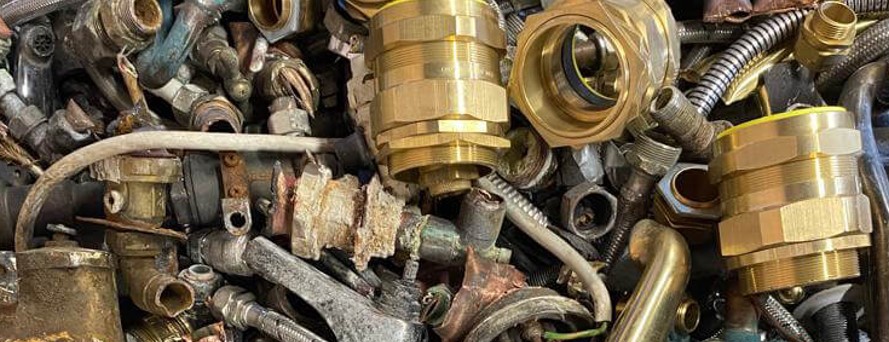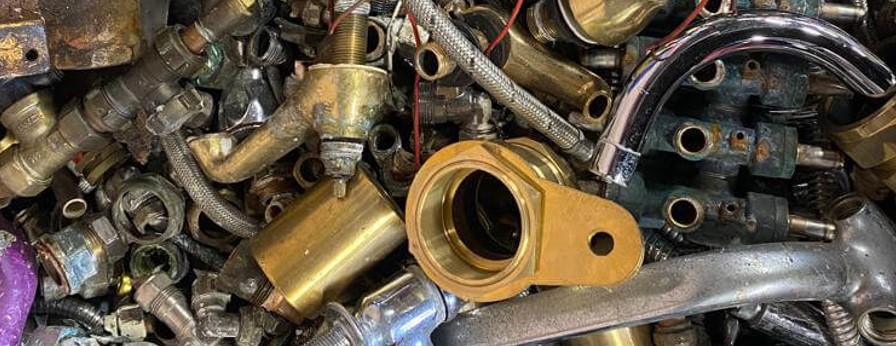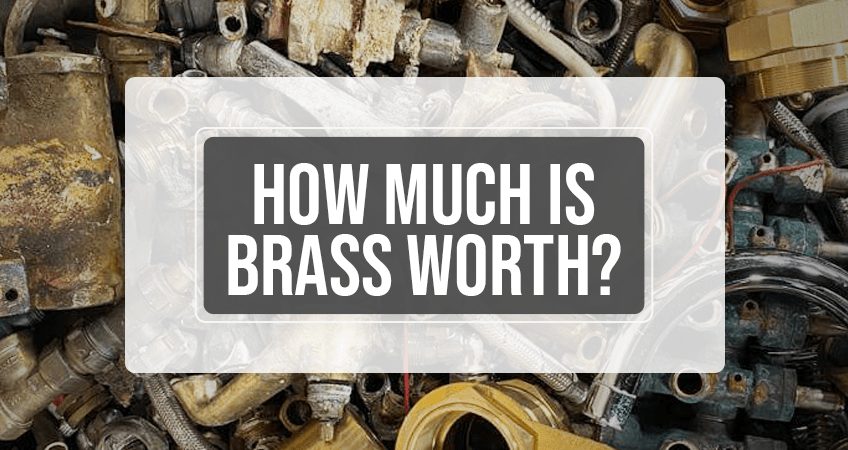Brass, a sturdy and versatile metal, routinely finds its way into a multitude of everyday objects. From door knobs and faucets to musical instruments and decorative items, brass is a common sight in households and commercial establishments alike.
Its ubiquity, combined with its inherent recyclability, makes it a commodity of value – particularly in a world that’s increasingly conscious about sustainable practices.
As we delve into the world of brass in this blog post, we’ll explore its worth and why recycling it is a shrewd move in 2024.
What is brass?
Brass, an alloy composed primarily of copper and zinc, is renowned for its hardness, durability, and resistance to corrosion. As it contains no iron, it falls into the category of non-ferrous metals along with aluminium, bronze, silver and gold.
It’s common in areas such as plumbing, decoration, and the music industry, where it’s used in the production of a variety of instruments like trumpets and cymbals.
Other places you can find brass

Building materials
Brass is often used in various fixtures and fittings due to its durability and resistance to corrosion.
Cars
Many vehicle components, such as radiators, brake cylinders, and electrical connectors, are made from brass.
Jewellery
Brass is utilised in the creation of many affordable jewellery pieces due to its gold-like appearance.
Antiques
Many antique items, such as old coins, lamps, candle holders, and clocks, are made of brass.
Musical instruments
Brass is a primary material used in the manufacture of wind instruments, such as trumpets, trombones, and saxophones.
Plumbing fittings
Brass is used extensively in the manufacture of taps, valves, and pipes due to its water-resistant properties.
Electronics
Brass is used in various electrical connectors and components due to its excellent conductivity.
How much is brass worth?
The worth of brass is influenced by several factors, including the global copper market, its composition, and purity. As of 2024, the value of brass stands at approximately £3.00 per kilogram. However, it’s always advisable to check the current rates with reliable scrap metal dealers, such as Mackers Metals, to get the most accurate valuation.
Factors that influence brass scrap metal prices in the UK
- Composition: As mentioned earlier, brass is an alloy composed primarily of copper and zinc, with the amount of each metal varying from one grade to another. The composition of brass plays a significant role in determining scrap brass prices, as higher levels of pure metals can fetch a higher price.
- Global copper market: Copper prices influence the value of brass, as it’s the primary component in its composition. The demand for copper, along with its availability, can cause fluctuations in brass prices.
- Purity: Brass is a recycled material, and its purity levels can affect how much it’s worth. Higher purity levels usually result in higher valuations.
Things to know before you consider recycling your brass

Before you start recycling brass, there are a few things to take into account. Firstly, separate your brass into clean and dirty categories – clean brass is free from any attachments, while dirty brass has other materials attached to it. Clean brass generally fetches a higher price.
Secondly, always remember that not all items that appear brass are pure brass. Some items are merely brass-plated and contain a different base metal. To check if your item is solid brass or brass-plated, you can use a magnet. If the magnet sticks, your item is brass-plated; if it doesn’t, it’s likely solid brass, which could fetch a higher price.
Lastly, it’s essential to know your local regulations concerning metal recycling. Some areas have specific rules and guidelines about the disposal and recycling of metals. If in doubt, the best course of action is to get in touch with your local scrap dealers. Our team at Mackers Metals have years of knowledge and experience and are always more than happy to share it.
Key reasons to recycle brass
We now delve into the compelling reasons that make recycling brass an intelligent move in 2024. We’ll examine the environmental, economic, and societal benefits that this practice brings.
Environmental benefits
Recycling brass offers considerable environmental benefits. Firstly, it reduces the need for mining new copper and zinc, thus conserving natural resources and minimising the environmental disruption caused by mining activities. Further, compared to producing new brass, recycling uses significantly less energy, leading to a decrease in global greenhouse gas emissions. Lastly, recycling brass prevents it from ending up in landfill sites, thus reducing pollution and its harmful effects on wildlife and ecosystems.
It can be recycled infinitely
Brass has a fascinating quality – it can be recycled countless times without losing its chemical or physical properties. Unlike some other materials that may deteriorate during recycling, brass maintains its characteristics. This means you can enjoy the benefits of recycling brass repeatedly, without any loss in quality or properties.
Economic advantages
Recycling brass offers compelling economic benefits. Firstly, it reduces the need to import copper and zinc – a significant advantage for countries whose economies are dependent on such imports. Additionally, recycling brass creates jobs in various industries that deal with processing and trading recyclable materials.
Social significance
Finally, recycling brass has several social advantages. It helps reduce waste accumulation in landfills and contributes to environmental sustainability. Recycling brass also promotes responsible consumption and production, a vital factor in achieving country-wide green initiatives.
How is my scrap brass recycled?
Recycling scrap brass involves several steps, diligently carried out by scrap dealers and recycling centres. Here is a step-by-step overview:
Collection
The first stage involves the collection of brass scrap from various sources, such as households, industries, and construction sites. A scrap metal dealer will play a pivotal role in gathering, sorting, and transporting this scrap to recycling centres.
Sorting
Once the scrap reaches the recycling centre or scrap yards, it’s sorted based on its composition. This is often done using a combination of manual inspection and magnet tests. Pure brass items are separated from brass-plated ones to ensure the highest quality recycled material.
Processing
The sorted brass scrap is then shredded into smaller pieces, facilitating the next stage of the process, which is melting.
Melting
The shredded brass is loaded into a furnace and heated to its melting point. The molten brass is then poured into moulds and left to cool.
Purification
The cooled brass is then subjected to electrolysis for purification, removing any remaining impurities. This creates high-quality, recycled brass that is ready for reuse.
Reformation
The purified brass is reheated and then rolled or drawn into the desired shape, such as sheets, rods or wires, ready for use in a new product.
This cycle of recycling can be repeated indefinitely without degrading the properties of the brass, making it a sustainable and environmentally-friendly material choice.
Recycling brass is a smart move in 2024
In conclusion, recycling brass is not only a smart move from an environmental perspective, but it also offers significant economic and societal benefits. As a highly recyclable material, brass provides a sustainable solution that lessens our dependence on newly mined resources, reduces energy consumption, and supports job creation.
Moreover, it promotes responsible consumption and production habits, key facets of green initiatives.
As you contemplate recycling your brass, remember that the team at Mackers Metals are here to guide you when you sell scrap metal. With years of experience and a deep understanding of the market, we’re ready to help you navigate the process and get the most value from your recyclable metals. Don’t hesitate to reach out and get started with our team.
To find out more about scrap metals and scrap prices, be sure to consult our complete scrap metal prices FAQ here.


